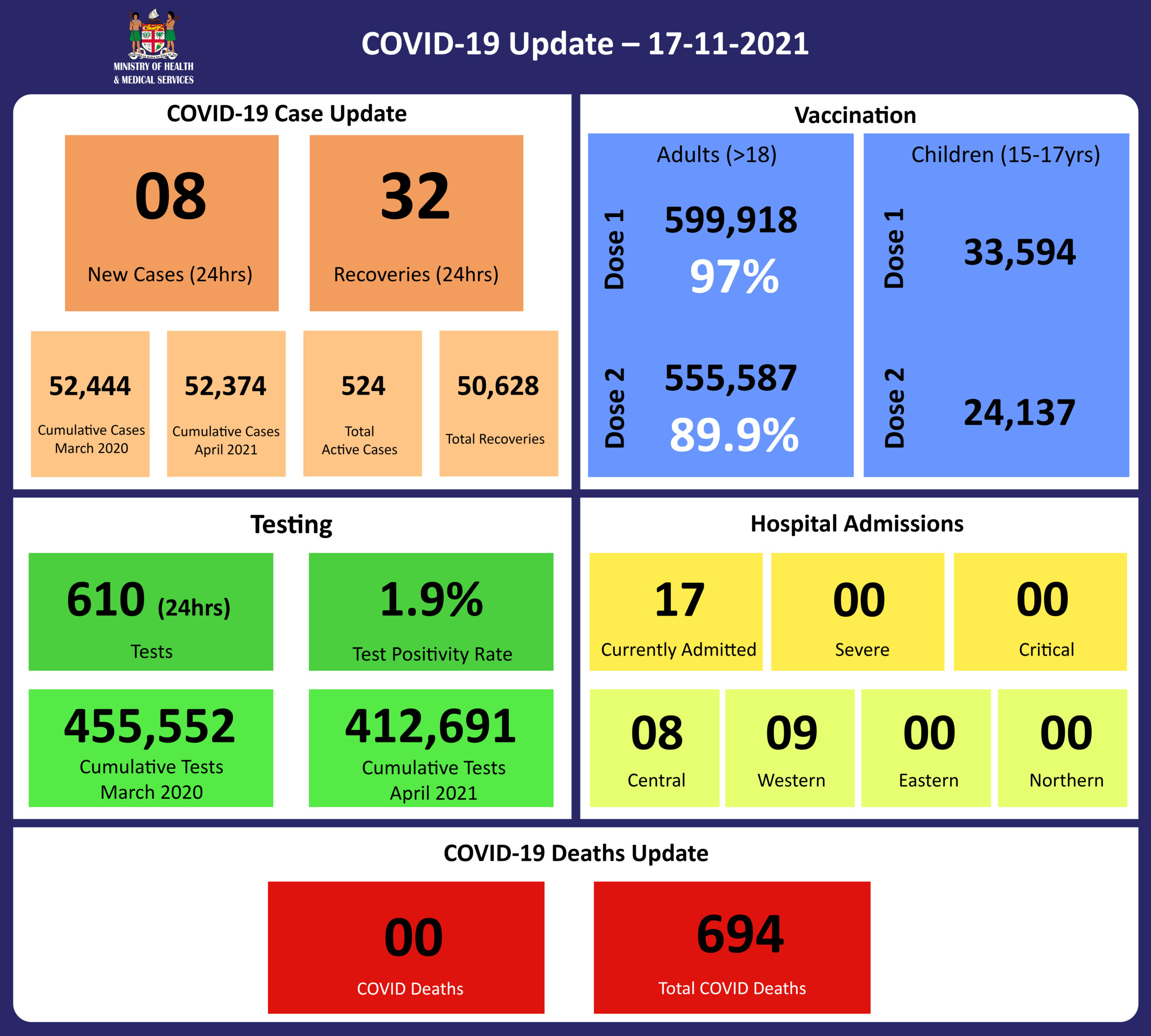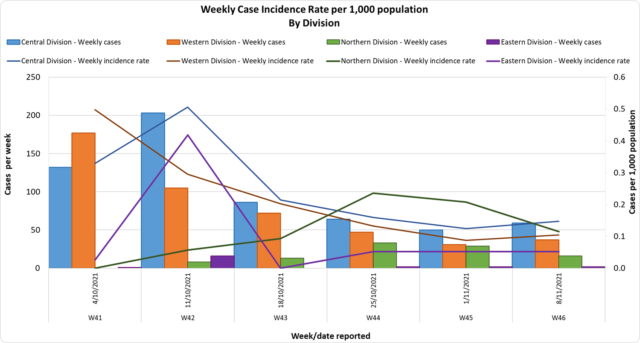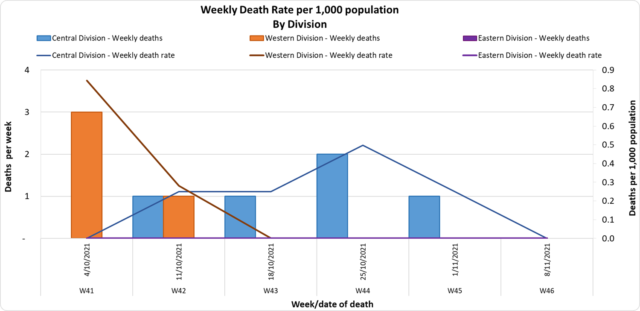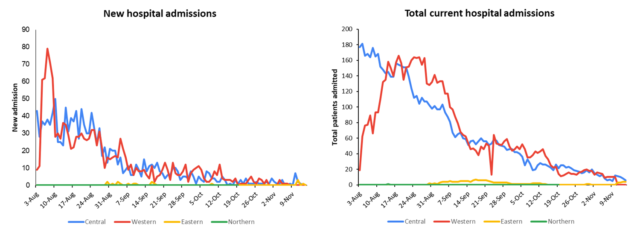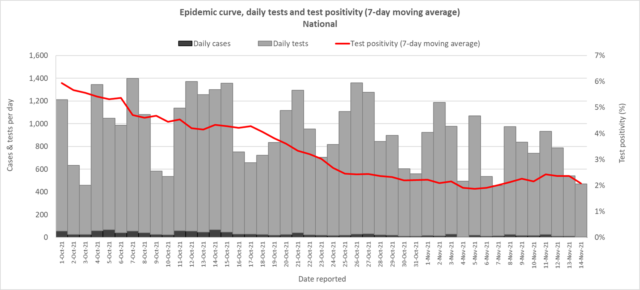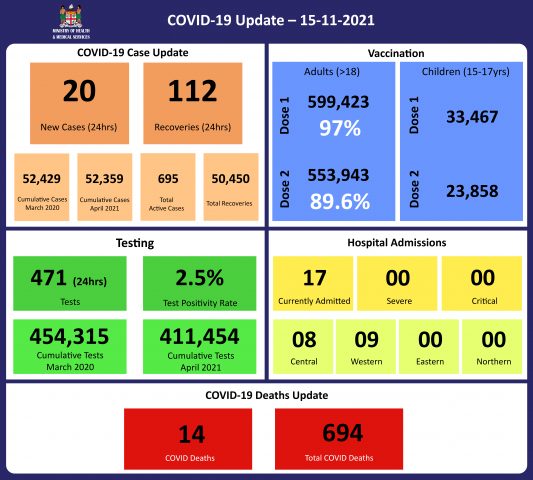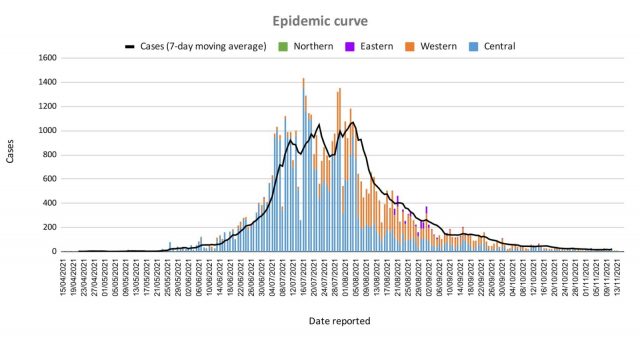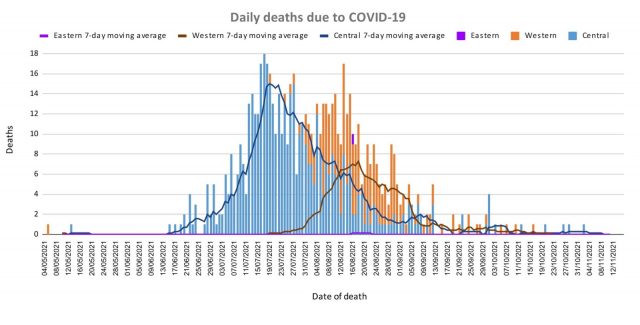90% Full Vaccination
Fiji achieves 90% full vaccination status
The Ministry of Health and Medical Services thanks all vaccine-eligible individuals who have stepped forward and received two doses of the COVID-19 vaccine. As of 17th November 2021, 600, 140 (97.1%) vaccine eligible individuals have received dose 1 of the COVID-19 vaccine, and 556,322 (90%) individuals have been fully vaccinated with two doses.
In accordance with the Honorable Prime Minister’s speech on 10th October 2021, once 90% of adults are fully vaccinated, the curfew hours will be from midnight to 4 am. This new curfew time is effective from tonight, Thursday 18th November 2021.
Although the achievement of these vaccination milestones results in the easing of restrictions, COVID-19 is still here and we must exercise caution to protect ourselves, our loved ones, and our Fiji.
The public is reminded that we must continue to adhere to COVID-19 safe measures of wearing masks appropriately, especially in indoor public spaces, covering our coughs and sneezes, washing our hands regularly with soap and water, or using a hand sanitizer and maintaining a safe physical distancing of 2 meters.
COVID-19 Update – 17-11-2021
| Transmission Update:
In the past 7 days, 46 cases were recorded in the Central division, 35 new cases in the Western division, 1 new case in the Eastern Division, and 14 new cases in the northern division. The Central division cases constitute 71% of the cumulative total cases nationally, with the Western division making up 28% and 1% in the Northern and Eastern Divisions. The 14 new cases recorded in the north are quarantine cases that are part of the repatriation program for the Northern division. Since the last update, we have recorded 15 new cases of which 7 new cases were recorded on 16/11/2021 and 8 new cases in the last 24 hours ending at 8 am this morning. The national 7-day rolling average of cases as of 13th November is 18 daily cases. The weekly incidence rate graph by division indicates a continually declining trend. Furthermore, the peak weekly incidence in the western division was approximately a third of that in the central division, and the cumulative case numbers are also reflecting a similar difference. |
| Deaths:
This curve depicts the weekly death rate per 1000 population by divisions since the 2nd wave of this outbreak that began in April 2021. Overall, the death rate graphs for the Central and Western Divisions indicate a declining trend. The differences between the Central and Western are similar to the incidence of the weekly cases and are likely a reflection of vaccination levels, COVID mitigation measures, and differences in population density. There is no COVID-19 death to report for today. There have been 694 deaths due to COVID-19 in Fiji, with 692 of these deaths during the outbreak that started in April this year. Please note that due to the time required by clinical teams to investigate, classify and report deaths, a 4-day interval is given to calculate the 7 days rolling average of deaths, based on the date of death, to help ensure the data collected is complete before the average is reported. Therefore, as of November 13th, the national 7 days rolling average for COVID-19 deaths per day is 0.0, with a case fatality rate of 1.32%. We have recorded 596 COVID-19 positive patients who died from serious medical conditions they had before they contracted COVID-19; these are not classified as COVID-19 deaths. |
| Hospitalisation:
The downward trend in both the new hospital admissions and total admissions in all hospitals admitting COVID-19 patients across the country is consistent with the cases and death trends. The hospital admissions continue on a downward trend indicating a sustained positive response to COVID mitigation measures, Population density differences, and differential Vaccination rates. |
| Testing:
610 tests have been reported for November 16th, 2021. The 7-day daily test average is 664 tests per day or 0.8 tests per 1,000 population. The national 7-day average daily test positivity is 1.9%, which is below the WHO recommendation of 5%, and this is illustrated by the lab testing graph. Though we continue testing in high-risk areas, our case numbers and test positivity rate indicate a better control of the community transmission in Fiji through the combined efforts of containment and mitigation measures with ongoing community surveillance. |
Epidemic Outlook:
The Ministry of Health continues to monitor the outbreak using indicators such as daily case numbers, hospitalizations, test positivity, and deaths. There is a downward trend across all indicators of the COVID-19 epidemic in Fiji, indicating a positive response to our overall COVID containment and mitigation response.
With borders opening soon, we anticipate our testing numbers to increase from local and international repatriates as well as visitors entering the country.
Occupancy rates in health facilities, the occupancy rate of ICU beds, death rates, and vaccination coverage are indicators to monitor our health response capacity and we see a decreasing trend across indicators from our health facilities with increasing vaccination coverage for adults and 15-17-year-olds in Fiji. With the commencement of vaccination for 12-14-year-olds, we expect their coverage to contribute to reducing the risk of severe disease, hospitalization, and death.
Our weekly testing numbers of over 4,500 are still above the WHO recommended rate of 4 tests per 1,000 population per week (or approx. 3,500 tests per week) and we anticipate continued surveillance and testing in our communities and maritime islands to monitor and detect cases for early intervention.
Public Advisory:
Changes to Curfew Hours
The Ministry of Health and Medical Services had expected to fully vaccinate 90% of the eligible adult population in Fiji by 13th November 2021. Pending confirmation of the 90% threshold, the curfew hours were to move to 12 am – 4 am from Sunday 14th November 2021.
Unfortunately, logistical issues posed challenges in vaccinating the remaining 10% of vaccine-eligible adults. The MHMS expectation of reaching 90% was not achieved over the weekend. We will continue our vaccination efforts from tomorrow onwards and review the data mid-week. Curfew hours will remain from 11 pm – 4 am.
Quarantine-free Domestic Travel
Given the improvement in vaccination coverage, all quarantine measures are lifted for domestic travel. This means registration and travel passes are no longer required. We are now transitioning into COVID-19 risk reduction protocols for domestic travel. This means that travel is restricted to fully vaccinated individuals with strict compliance to passenger capacity of 50% in vessels servicing to and from Vanua Levu and the maritime islands, together with the stringent application of COVID-19 safety measures.
The responsibility for ensuring the above restrictions will be with shipping owners. Our border health teams will continue to monitor the oversight provided by the shipping companies and ensure that COVID-19 safety measures are followed and travel guidelines are adhered to.
Low Vaccination Areas (<60%)
In the maritime islands with low vaccination coverage, the public is advised to adhere strictly to the COVID-19 safety measures of social distancing, hand washing, and appropriate masking to mitigate the risks of community transmission. A 7-day quarantine period will be instituted for all travelers into these pockets of communities with low vaccination coverage rates. The quarantine requirement for low coverage areas will be further assessed once vaccination coverage rates have improved.
Low vaccination areas can be viewed at the following link: https://bit.ly/3ln8jqx
Adverse Events Following Immunisation (AEFI)
Following concerns raised about vaccination safety, it is very important to understand what adverse events following immunization (AEFI) are and the management by MHMS should any such event arise.
An adverse event following immunizations (AEFI) is expected with the rolling out of any vaccine. As the COVID-19 vaccines rolled out in Fiji, the Ministry of Health and Medical Services included in its COVID-19 plans, preparation, and responses to any adverse events that may arise out of the vaccination roll-out.
An AEFI includes any unexpected medical event that any individual may experience following vaccination, which may or may not be related to the vaccine.
The MHMS has in place an AEFI investigation system comprising an AEFI officer with internal (FIJI) and external (international) panels that are responsible for receiving AEFI and investigating reported events. For milder cases, the AEFI officer also facilitates follow-up via multiple means (phone calls, Viber, Messenger, or emails).
Events requiring admission in the hospital and close follow-up are done with the medical teams in the hospital are assessed by the Fiji panel, who then document case details and verify important information before they are discussed with our international panel.
Fatal events may be assessed by post mortem. For COVID positive cases where a post mortem was not possible, the health team conducts a verbal autopsy process (internal & external panel) to confirm the cause of death.
A total of 64 AEFI was reported of which 55 AEFI (85.9%) are non-serious cases and 9 AEFI (14.0%) met serious cases criteria (cases that require hospital admission and reports of deaths post-vaccination). Analysis showed that 47 AEFIs (73.4%) were reported from the medical bay at the vaccination sites, while the most common side effects reported were fever, body pain, and hives. A total of 62 cases have been completely investigated while 2 cases are still under investigation. Of these investigated cases 61 were adult cases and 1 child. TO DATE NONE OF THE REPORTED CASES OF SERIOUS AEFI WERE ASSESSED TO BE COVID-19 VACCINE-RELATED.
COVID-19 Vaccination Certificate for Travelers
The Ministry of Health and Medical Services informs members of the public intending to travel overseas, the requirements, and the application process for the issuance of a COVID-19 vaccination certificate.
Traveling individuals are required to send an application for the vaccination certificate to the Ministry of Health and Medical Services via email: covidvaxcertificate@gmail.com and attach scanned copies of the following documents:
- Vaccination card (front and back copy),
- Biodata page of the passport,
- Travel itinerary (as proof of travel),
- Permit Number or Citizen Number if not a Fijian citizen.
The complete set of documents when received will be used to verify the individual’s vaccination status, this process is expected to take 3-7 days. Delays may be experienced if the information provided is not verifiable with the vaccine registration system.
Any individual who has been vaccinated in another country will need to provide an internationally recognized vaccination certificate issued by that country, therefore, they need not apply for a vaccination certificate from the Fijian Government.
COVID-19 Update – 15-11-2021
| Transmission Update:
Since the last update, we have recorded a total of 32 new cases; of which 7 new cases were recorded on 13/11/2021, 5 new cases were recorded on 14/11/2021 and 20 new cases in the last 24 hours ending at 8 am this morning. This epidemic curve depicts the daily positive cases since the 2nd wave of this outbreak began in April 2021. Overall for this 2nd wave, there have been 52,359 cases recorded, with 71% of the cases from the Central Division, 28% of the cases from the Western Division, and 1% of the cases from the Eastern and Northern Division. Our National 7- day rolling average is 19 daily cases calculated for 11th November 2021. |
| Deaths:
This curve depicts the weekly death rate per 1000 population by divisions since the 2nd wave of this outbreak began in April 2021. Overall the death rate graphs for the Central and Western Divisions indicate a declining trend. The differences between the Central and Western are similar to the incidence of the weekly cases and are likely a reflection of vaccination levels, COVID mitigation measures, and differences in population density. We have additional 14 COVID-19 deaths to report between the period 6th August 2021- 19th September 2021. All deaths were reported from the Western Division. An analysis of the 14 deaths has highlighted that individuals were aged between 46 to 84 years, 57% (n=8) were males, 42% (n=6) of the individuals died at home or on their way to the hospital. None of the deaths were vaccinated. This means they did not receive any dose of the COVID-19 Vaccine. There have been 694 deaths due to COVID-19 in Fiji, with 692 of these deaths during the outbreak that started in April this year. Please note that due to the time required by clinical teams to investigate, classify and report deaths, a 4-day interval is given to calculate the 7 days rolling average of deaths, based on the date of death, to help ensure the data collected is complete before the average is reported. Therefore, as of November 11th, the national 7 days rolling average for COVID-19 deaths per day is 0.0, with a case fatality rate of 1.32%. We have recorded 588 COVID-19 positive patients who died from serious medical conditions they had before they contracted COVID-19; these are not classified as COVID-19 deaths. |
Epidemic Outlook:
The Ministry of Health continues to monitor the outbreak using indicators such as daily case numbers, hospitalizations, test positivity, and deaths. There is a downward trend across all indicators of the COVID-19 epidemic in Fiji, indicating a positive response to our overall COVID containment and mitigation response.
With borders opening soon, we anticipate our testing numbers to increase from local and international repatriates as well as visitors entering the country.
Occupancy rates in health facilities, the occupancy rate of ICU beds, death rates, and vaccination coverage are indicators to monitor our health response capacity and we see a decreasing trend across indicators from our health facilities with increasing vaccination coverage for adults and 15-17-year-olds in Fiji.
Our weekly testing numbers of over 5,000 are still above the WHO recommended rate of 4 tests per 1,000 population per week (or approx. 3,500 tests per week) and we anticipate continued surveillance and testing in our communities and maritime islands to monitor and detect cases for early intervention.
Public Advisory:
Changes to Curfew Hours
The Ministry of Health and Medical Services had expected to fully vaccinate 90% of the eligible adult population in Fiji by 13 November 2021. Pending confirmation of the 90% threshold, the curfew hours were to move to 12 am – 4 am from Sunday 14 November 2021.
Unfortunately, logistical issues posed challenges in vaccinating the remaining 10% of vaccine-eligible adults. The MHMS expectation of reaching 90% was not achieved over the weekend. We will continue our vaccination efforts from tomorrow onwards and review the data mid-week. Curfew hours will remain from 11 pm – 4 am.
Quarantine-free Domestic Travel
Given the improvement in vaccination coverage, all quarantine measures are lifted for domestic travel. This means registration and travel passes are no longer required. We are now transitioning into COVID-19 risk reduction protocols for domestic travel. This means that travel is restricted to fully vaccinated individuals with strict compliance to passenger capacity of 50% in vessels servicing to and from Vanua Levu and the maritime islands, together with the stringent application of COVID-19 safety measures.
The responsibility for ensuring the above restrictions will be with shipping owners. Our border health teams will continue to monitor the oversight provided by the shipping companies and ensure that COVID-19 safety measures are followed and travel guidelines are adhered to.
Low Vaccination Areas (<60%)
In the maritime islands with low vaccination coverage, the public is advised to adhere strictly to the COVID-19 safety measures of social distancing, hand washing, and appropriate masking to mitigate the risks of community transmission. A 7-day quarantine period will be instituted for all travelers into these pockets of communities with low vaccination coverage rates. The quarantine requirement for low coverage areas will be further assessed once vaccination coverage rates have improved.
Low vaccination areas can be viewed at the following link: https://bit.ly/3ln8jqx
MHMS Preparedness and Response Plans for Future Surges
The Ministry of Health & Medical Services has escalated preparedness and response plans to mitigate against and manage surges in cases through:
- Early warning system set up in all maritime islands and oversight in place to ensure 100% weekly reporting of Acute respiratory illness and Febrile illness from all facilities
- Prepositioning of Air, Land, and Sea-based capability to facilitate retrieval of cases within Vanua Levu and from Maritime Islands to sub-divisional and divisional hospitals
- The clinical capability has been escalated in health centers and nursing stations to facilitate early diagnosis, monitoring, and referral of sentinel cases.
- Testing capacity has been escalated in Viti Levu to support travel to the North and Maritime islands
- Clinical Care capability in the 3 divisional hospitals have been escalated
- Reviewing and strengthening clinical care protocols for severe disease in all sub-divisional and divisional hospitals.

